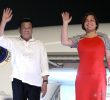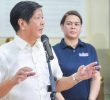While there have been recent developments on the side of the GPH in response to a proposal submitted by the NDFP, Olalia, however, said he’s not at liberty to say what is its current status. He revealed though that the Aquino administration has sent emissaries to meet the negotiators in The Netherlands sometime last month.
By MARILOU AGUIRRE-TUBURAN
Davao Today
DAVAO CITY, Philippines — The legal consultant of the National Democratic Front of the Philippines’ (NDFP) Peace Negotiating Panel said there’s still hope for the resumption of peace talks with the Government of the Philippines (GPH).
Lawyer Edre Olalia, in a forum sponsored by a peace advocacy group, Sowing the Seeds for Peace, on Saturday, also pointed out that the country’s economic crisis will push the NDFP and GPH “to discuss problems and find solutions.”
While there have been recent developments on the side of the GPH in response to a proposal submitted by the NDFP, Olalia, however, said he’s not at liberty to say what is its current status. He revealed though that the Aquino administration has sent emissaries to meet the negotiators in The Netherlands sometime last month.
Olalia, who’s also the secretary general of the National Union of People’s Lawyers, said that “timing” remains a question.
In February 2011, the formal talks between the GPH and NDFP resumed after a gridlock of more than six years under the Arroyo government. This happened following the December 2010 exploratory talks in Hong Kong and the January 2011 Preliminary talks in Oslo Norway with the help of the Royal Norwegian Government.
NDFP chairperson Luis Jalandoni said, in his closing statement in the February 2011 talks, the impasse was caused by the Arroyo administration’s “unilateral and prolonged suspension” and the “grievous violations of the bilateral agreements” entered by both Parties.
But just like with the Arroyo government, peace talks with the Aquino administration has been stalled stemming from “non-negotiable positions.”
Major obstacles
One of the major obstacles of the resumption of peace talks, Olalia said, was the GPH’s refusal to release all or most of the 17 NDFP Consultants detained by the GRP/GPH.
In a joint communiqué dated 18 January 2011 by the end of exploratory talks, the GPH Panel agreed to “work for the expeditious release of detained NDFP consultants and other Jasig-protected persons.” This was in compliance with the Joint Agreement on Safety and Immunity Guarantees (Jasig) which supposedly protects the consultants from arrest and detention.
Olalia said that without compliance with Jasig, the panelists and consultants cannot function, and that Jasig is needed to build confidence.
Olalia also noted “a very serious obstacle.” He said that the GPH, for the first time, has undermined the basic bilateral agreements. In February, the GPH Peace Panel has attacked The Hague Joint Declaration as a document of “perpetual division.”
He furthered, the GPH declared that Jasig does not require compliance and that it’s only at their whim that they shall release detained Jasig-protected NDFP consultants.
The GPH, he noted, also refused to release about 400 political prisoners in accordance with the clear directive of the Comprehensive Agreement on Respect for Human Rights and International Humanitarian Law (Carhrihl).
Olalia also said that the US government poses a “huge obstacle” especially by imposing its Counter Insurgency Guide of 2009 as a counterrevolutionary doctrine followed by the Aquino government through the Internal Security Plan, Oplan Bayanihan. The US, he added, “stations interventionist troops in the Philippines.”
Despite these obstacles, Olalia believes there are “subjective factors” and “objective conditions” that will push both parties to go back to the negotiating table.
‘Special track’
The NDFP has proposed a special track or the Proposal for Alliance and Truce. It was meant to “speed up and complement the regular track and not to replace or supplant it.”
During the February 2011 talks, the Panels agreed on a general timeframe to complete the draft comprehensive agreements of the agenda. The draft Comprehensive Agreement on Social and Economic Reforms is targeted for completion in September 2011; the draft Comprehensive Agreement on Political and Constitutional Reforms in February 2012; and the draft Comprehensive Agreement on End of Hostilities and Disposition of Forces in June 2012.
NDFP’s Special Track has six elements, namely: Declaration of Unity and Peace; Strengthen national independence and promote industrial development; Creation of new political instruments to realize and promote the alliance; Identification of at least 20 key Philippine-controlled industrial projects in cooperation with other countries to complement other peace-building projects with assistance from various countries; and Carry out land reform program allowing big landowners to sell their land and invest in the industrial projects and truce leading to a just and lasting peace.
‘Resume the talks’
The Sowing the Seeds for Peace, a Mindanao movement called on the resumption of the GPH-NDFP peace talks.
“We hope for the resumption of the peace talks,” said Iglesia Filipina Independiente Bishop Delfin Callao in a statement.
Callao, co-convener of the peace movement, said they are for the “full and sincere implementation of the Carhrihl” which he said has been repeatedly violated especially “in the context of worsening state of impunity in Mindanao.”
He added that the peace agenda “are crucial in the attainment of peace and social justice” for the majority of the Filipinos. He also said, the peace talks provide the people the opportunity “to achieve significant, immediate, and long term societal changes or reforms to address the root cause of the armed conflict.”
Meanwhile, Olalia said, the measure of sincerity in peace negotiations lies in the parties’ “adherence to agreements” and “seriousness in envisioning, proposing, crafting and forging an agreement on fundamental reforms that would address the roots of the armed conflict.” (Marilou Aguirre-Tuburan/davaotoday.com










